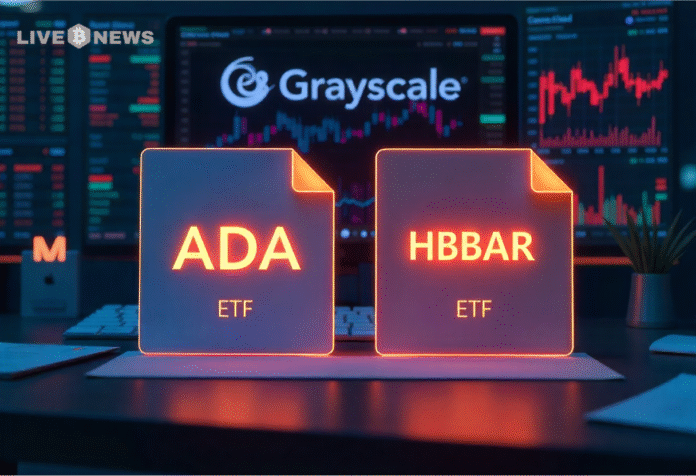Grayscale registered new trusts for Cardano and Hedera, hinting at possible spot ETF launches as regulatory clarity improves.
Grayscale has taken a major step toward launching spot Cardano and Hedera exchange-traded funds (ETFs). This week, the company registered two new statutory trusts in Delaware for both assets, marking its first ETF-related filings for these altcoins in the state.
The registrations, which were dated August 12, list the entities as the Grayscale Cardano Trust ETF and the Grayscale Hedera Trust ETF.
Both are organised as general statutory trusts, which is a format the firm has used in the past before filing official ETF applications.
Why Grayscale’s Cardano and Hedera Filings Matter
Grayscale has a track record of registering trusts before making S-1 filings with the SEC. Earlier this year, the SEC acknowledged NYSE Arca’s 19b-4 form for a spot Cardano ETF and Nasdaq’s form for a Hedera ETF.
🚀ADA SURGES INTO THE SPOTLIGHT!
Cardano ($ADA) is now Grayscale’s #3 top gainer, jumping 21.9% in 7 days and hitting a 20-week high of $0.89! 🔥
With bullish signals flashing, some analysts say $3 ADA could be next… 👀 pic.twitter.com/A1tFwMqidW
— Coin Bureau (@coinbureau) July 19, 2025
Those acknowledgements started the formal review process, but SEC approval is still required before trading can begin.
This expansion into Cardano and Hedera works well with Grayscale’s existing altcoin trusts, which include Dogecoin, Filecoin, Avalanche and Bittensor. It also comes at a time when U.S. investment managers are increasing their efforts to bring altcoin-based ETFs to market.
Regulatory Environment Creates Tailwinds for Altcoin ETFs
Recent regulatory developments are improving the odds for ETF approvals. The SEC recently approved in-kind redemption mechanisms for spot Bitcoin and Ether ETFs. This would make it easier for institutional investors to trade these products more effectively.
At the same time, the SEC and the Commodity Futures Trading Commission are working together on “Project Crypto.” This initiative is aimed at classifying digital assets under U.S. law and determining which tokens qualify as securities. This clarity could remove a major barrier for firms that want to launch ETFs tied to cryptocurrencies.
Spot ETFs Could Boost Cardano and Hedera Adoption
Cardano is known for being research-focused and emphasising scalability. It has built a reputation for strong upgrades and academic peer review. Hedera, on the other hand, offers a different model and uses a hashgraph consensus system that targets enterprise use cases.
This means that Hedera is great for use cases in supply chain management, tokenised assets, and identity solutions.
If spot Cardano and Hedera ETFs are approved, they could attract investors who prefer to buy through traditional brokerage accounts rather than directly on crypto exchanges. These ETFs would also improve liquidity for both tokens, as institutional money flows in.
Grayscale’s Expansion Plans
Beyond the Cardano and Hedera moves, Grayscale recently launched investment trusts for DeepBook and Walrus, two projects providing trading and data services on the Sui blockchain.
The company also filed confidentially for a U.S. initial public offering last month, which shows that it plans to grow its market presence across both crypto and traditional financial sectors.
Industry analysts are now expecting the company to maintain an aggressive strategy in securing ETF approvals for various cryptocurrencies.
What Comes Next
The Delaware filings show that Grayscale is laying the groundwork for these ETFs ahead of the final regulatory clearance. While approval is not guaranteed as of yet, market sentiment has been green historically for both products due to recent SEC decisions.
We're excited to announce two new products, the Grayscale DeepBook and Walrus Trusts $DEEP $WAL.
Built on @SuiNetwork, $WAL helps enable decentralized data management at scale, while $DEEP serves as the foundational liquidity layer for DeFi applications. 👇 pic.twitter.com/DdrtH5xbKA
— Grayscale (@Grayscale) August 12, 2025
If approved, the spot Cardano and Hedera ETFs could launch as early as next year.
For now, traders and investors will be watching for the company’s S-1 filings with the SEC. This would mark the next step toward making these products available on U.S. exchanges.





